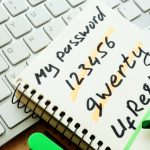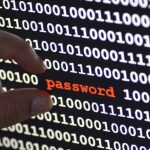JPMorgan to ban third-party fintech platforms from accessing customer passwords

JPMorgan Chase is to enforce stricter security measures, banning third-party fintech apps from accessing customer passwords.
The existing method of data sharing provides -- with permission -- numerous apps with access to customers' bank accounts, but concerns have been voiced about the possible dangers. No timetable has been set out, but the American finance giant intends to use a token-based system that will provide third parties with access to "a narrow range of data in a secure form".
The top 20 passwords that you shouldn't be using

Despite data breaches involving stolen or cracked passwords constantly being in the news, it seems people are still making poor choices when it comes to their login credentials.
Password manager NordPass has compiled a list of the 200 most commonly used passwords of 2019 and highlighted the 20 you should never be using.
Weak passwords leave UK businesses at risk of cyberattack

Millions of people and hundreds of thousands of businesses in the UK are using cracked or weak passwords for their online accounts according to new research.
Cybersecurity and data analytics CybSafe has conducted a blind-analysis of the passwords used by over 21,000 staff at a sample group of 250 UK businesses, and finds that three quarters are employing staff with vulnerable password combinations -- either passwords which are too simple, or which have been compromised in previous data breaches.
New tool helps in the fight against weak passwords

Poor passwords frequently provide hackers with a way into networks. In order to help security teams and penetration testers identify them, Trustwave is launching a new cracking tool.
CrackQ is a queuing system to manage password cracking that works with the Hashcat tool which uses the power of GPUs to crack passwords.
If your password is 'superman' or 'blink182' you might want to change it

The UK's National Cyber Security Centre has released its annual review for 2019 which sets out cybersecurity trends and looks at how the agency has been protecting consumers and businesses.
One of the most interesting findings is the list of most hacked passwords. 'Superman', exposed 333,139 times, and 'blink182', exposed 285,706 times, top the lists for fictional characters and musicians respectively. If you are a soccer fan, 'liverpool', exposed 280,723 times, is not a good password choice. But it's old favorite '123456', exposed more than 23 million times, that's top overall.
Google launches enhanced password management capabilities

According to a Harris Poll carried out for Google, 75 percent of Americans get frustrated trying to manage all their passwords.
This results in unsafe practices as 24 percent have used the following common passwords, or some variation: like 'abc123', 'Password', or '123456'. 59 percent of US adults have incorporated a name (their own, a family member's, a partner's, or a pet’s) into their password to an online account, 22 percent have used their own name and a third have used their pet's name or a variation as their password.
LastPass fixes bug that exposed passwords

The browser extensions for password management tool LastPass suffered from a vulnerability that meant users' passwords could be leaked, a Google Project Zero researcher reported.
Affecting the Chrome and Opera extensions, the vulnerability meant that malicious websites could trick LastPass into exposing usernames and passwords. LastPass explains that the problem stemmed from a "limited set of circumstances" that allowed for clickjacking. The good news is that the security flaw has been patched.
D-Link and Comba routers have multiple vulnerabilities, including storing passwords in plain text

A security researcher has revealed details of a series of vulnerabilities in routers made by D-Link and Comba which make it easy to see usernames and passwords.
Simon Kenin from Trustwave SpiderLabs -- an "elite team of ethical hackers, forensic investigators and researchers" -- found a total of five security flaws which involve the insecure storage of credentials. In some instances, passwords are stored in plain text and can be seen by anyone with network or internet access to the routers in question.
Web host Hostinger resets 14 million customer passwords following data breach

Hosting company Hostinger has reset passwords for all of its customers after a data breach in which a database containing information about 14 million users was accessed "by an unauthorized third party".
Hostinger says that the password reset is a "precautionary measure" and explains that the security incident occurred when hackers used an authorization token found on one of the company's servers to access an internal system API. While no financial data is thought to have been accessed, hackers were able to access "client usernames, emails, hashed passwords, first names and IP addresses".
Password stealing malware on the rise as 60 percent more users are targeted

Password stealing malware is a key weapon in the cybercriminals' armoury, seeking to grab data directly from users' web browsers using a range of methods.
According to new data from Kaspersky, the number of users, targeted by password stealers, has peaked from less than 600,000 in the first half of 2018 to over 940,000 during the same period in 2019.
Microsoft releases Windows 10 20H1 Build 18936 with passwordless sign-ins

Even though the next major feature update for Windows 10 isn’t due for a year, Microsoft is rolling out weekly new builds for it.
Windows 10 20H1 Build 18936 offers a number of new features, including the ability to go passwordless on your device, and create calendar events directly from the taskbar.
Cloud identity solution lets developers deliver passwordless login and MFA

Identity specialist Ping identity is announcing an update to its PingOne for Customers IDaaS solution that means developers can now deliver passwordless and advanced multi-factor authentication from custom mobile applications.
Enhancements include a mobile SDK that allows development teams to send push notifications to custom mobile applications for MFA, APIs for logins via social media accounts, and support for single sign-on via Security Assertion Markup Language (SAML).
NordVPN has a new password manager in the pipeline -- NordPass

NordVPN -- as its name suggests -- is perhaps most readily associated with its privacy and security-focused VPN solutions. But this is not all the company has to offer.
Having already released a file encryption service in the form of NordLocker, NordVPN has now revealed that it has a new password management tool. Due for release later this year, NordPass has been designed to be secure yet simple to use, and NordVPN is trying to help people from making the mistake of using the same password everywhere.
Security software is causing Firefox users to lose saved passwords

Firefox users are reporting that their saved passwords have been lost, with the problem seemingly caused by antivirus software rather than being an issue with Firefox itself.
Antivirus software such as Avast and AVG appears to be corrupting the file in which Firefox stores passwords, rendering it unreadable. Thankfully, passwords can be recovered, but -- for the time being --- they will be corrupted again when you restart your computer.
Want someone's personal data? Give them a free donut

While you might expect Homer Simpson to hand over personal details in exchange for a donut, you wouldn't expect cybersecurity professionals to do the same.
However, technology services provider Probrand has carried out a study at a cyber expo attended by UK security professionals, where attendees voluntarily shared sensitive data including their name, date of birth and favourite football team -- all to get their hands on a free donut.
Recent Headlines
Most Commented Stories
BetaNews, your source for breaking tech news, reviews, and in-depth reporting since 1998.
© 1998-2025 BetaNews, Inc. All Rights Reserved. About Us - Privacy Policy - Cookie Policy - Sitemap.